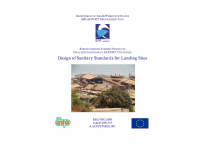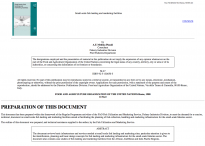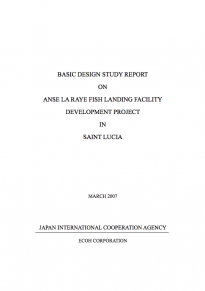Services and Infrastructure for Landing Sites in Small-Scale Fisheries
Key services and infrastructure associated with landing sites and which ensure the facilities optimize fish handling and first point of sale activities and contribute to reducing or preventing food loss and waste (FLW) include:
- Road and modern infrastructure
- Electricity
- Water supply
- Sea/inland water access
- Jetties
- Building infrastructure
- Sewerage and drainage
- Parking area
- Office
- Ice supply
- Fuel (bunkerage)
- Landing site management
- Hygiene facilities – washroom, toilets
- Food safety control
- Packaging/containers
Building infrastructure can be found in the Design of Sanitary Standards for Landing Sites.
Landing Site Ownership
Landing Site Ownership
Landing sites are typically in private ownership (operated for the benefit and profit of a single owner); owned communally (operated for the joint benefit of a number of people as in a co-operative society); or they might be owned publicly. Publicly-owned facilities may be provided from taxes for the common welfare and good, or they may be used by individuals on payment of a statutory fee. Communally used facilities that are publicly or commonly owned include the jetty, quay or wharf and the auction point or market. Other facilities, however, such as the ice plant, packing sheds, factories, and repair and maintenance facilities are usually operated as private business.
Landing Site Management
Landing Site Management
Proper management of landing sites is essential. A detailed plan of operations should be prepared during the planning stages and used to establish clearly, each staff member's functions. This plan should also establish detailed procedures for the systematic collection, handling, storage and distribution of landings, method of payment, issue of receipts, weighing system, daily sales and marketing expenses recording system, and the preparation of monthly financial reports. In the case of fish landing centres with fuel and oil service stations, gear and engine workshops, ice plants, supplies stores, etc., a detailed plan of operations and procedures for each component should also be prepared.
Management should ensure that the common practices required for good hygiene are observed both to protect the consumer and to make certain that the fishermen get the best possible prices for their catches.
Basic decision-making skills and supervisory capacity are vital for good management. Training in technical and organizational methods will often be required to upgrade staff skills to enable them to successfully overcome daily fish marketing problems.
Revenue for maintenance and management can be generated from fees for berthing, a commission of auction or sale price, chill or cold storage charges.
Key Publications
Design of Sanitary Standards for Landing Sites
This publication is designed to assist policy makers and local consultants in their work to develop modern and efficient landing sites capable of landing and handling fish to the required standards. | |
Small-scale Fish Landing and Marketing Facilities This publication aims to aid small-scale fisheries development, specifically addressing the identification, planning and basic designs needed for fish collection, handling, and marketing infrastructure, with focus on reduction of post-harvest losses and marketing costs. | |
Basic Design Study Report on Anse La Raye Fish Landing Facility Development Project in Saint Lucia
Report on a project to develop fish landing facilities. Includes preliminary study findings and design details. |
More Resources
More Resources
31 October 2023














